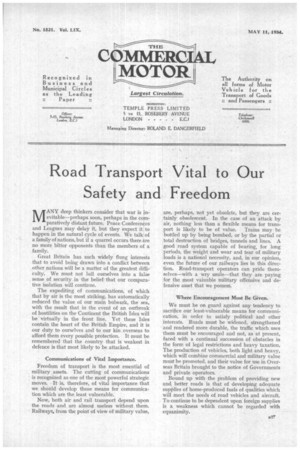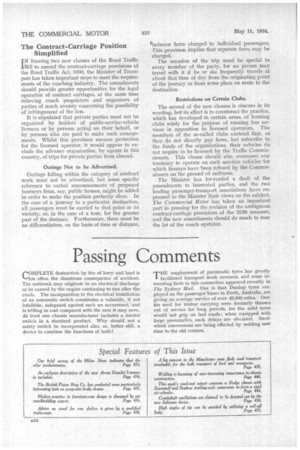Road Transport Vital to Our Safety and Freedom
Page 35

Page 36

If you've noticed an error in this article please click here to report it so we can fix it.
MANY deep thinkers consider that war is nevitable—perhaps soon, perhaps in the cojmparatively distant future. Peace Conferen es and Leagues may delay it, but they expect it to happen in the natural cycle of events. We talk of a family of nations, but if a quarrel occurs there are no more bitter opponents than the members of a family.
Great Britain has such widely flung interests that to avoid being drawn into a conflict between other nations will be a matter of the greatest difficulty. We must not lull ourselves into a false sense of security in the belief that our comparative isolation will continue.
The expediting of communications, of which that by air is the most striking, has automatically reduced the value of our main bulwark, the sea, with the result that in the event of an outbreak of hostilities on the Continent the British Isles will be virtually in the front line. Yet these Isles contain the heart of the British Empire, and it is our duty to ourselves and to our kin overseas to afford them every possible protection. It must be remembered that the country that is weakest in defence is that most likely to be attacked.
Communications of Vital Importance.
Freedom of transport is the most essential of military assets. The cutting of communications is recognized as one of the most powerful strategic moves. It is, therefore, of vital importance that we should develop those means for communication which are the least vulnerable.
Now, both air and rail transport depend upon the roads and are almost useless without them. Railways, from the point of view of military value, are, perhaps, not yet obsolete, but they are certainly obsolescent. In the case of an attack by air, nothing less than a flexible means for transport is likely to be of value. Trains may be bottled up by being bombed, or by the partial or total destruction of bridges, tunnels and lines. A good road system capable of bearing, for long periods, the weight and wear and tear of military loads is a national necessity, and, in our opinion, even the future of our railways lies in this direction. Road-transport operators can pride themselves—with a wry smile—that they are paying for the most valuable military offensive and defensive asset that we possess.
Where Encouragement Must Be Given.
We must be on guard against any tendency to sacrifice our least-vulnerable means for communication, in order to satisfy political and other interests. Roads must be widened, strengthened and rendered more durable, the traffic which uses them must be encouraged and not, as at present, faced with a continual succession of obstacles in the form of legal restrictions and heavy taxation. The production of vehicles, both light and heavy, which will combine commercial and military value must be promoted, and their value for use in Overseas Britain brought to the notice of Governments and private operators.
Bound up with the Problem of providing new and better roads is that of developing adequate supplies of home-produced fuels of qualities which will meet the needs of road vehicles and aircraft. To continue to be dependent upon foreign supplies is a weakness which cannot be regarded with equanimity.
The Contract-Carriage Position Simplified
F framing two new clauses of the Road Traffic IBill to amend the contract-carriage provisions of the Road Traffic Act, 1930, the Minister of Transport has taken important steps to meet the requirements of the coaching industry. The amendments should provide greater opportunities for the legal operation of contract carriages, at the same time relieving coach proprietors and organizers of parties of much anxiety concerning the possibility of infringement of the law.
It is stipulated that private parties must not be organized by holders of public-service-vehicle licences or by persons acting on their behalf, or by persons who are paid to make such arrangements. Whilst this provision ensures protection for the licensed operator, it would appear to exclude the advance organization, by agents in this country, of trips for private parties from abroad.
Outings Not to be Advertised.
Outings falling within the category of contract work must not be advertised, but some specific reference to verbal announcements of proposed journeys from, say, public houses, might be added in order to make the position perfectly clear. In the case of a journey to a particular destination, all passengers must be carried to that point or its vicinity, or, in the case of a tour, for the greater part of the distance. Furthermore, there must be no differentiation, on the basis of time or distance, ibetween fares charged to individual passengers. This provision implies that separate fares may be charged.
The occasion of the trip must be special to every member of the party, for no person may travel with it if he or she frequently travels at about that time of day from the originating point of the journey or from some place en route to the destination.
Restrictions on Certain Clubs.
The second of the new clauses is obscure in its wording, but its effect is to counteract the practice, which has developed in certain areas, of forming clubs solely for the purpose of running bus services in opposition to licensed Operators. The members of the so-called clubs contend that, as they do not directly pay fares, but subscribe to the funds of the organizations, their vehicles do not require to be licensed by the Traffic Commissioners. This clause should also overcome any tendency to operate on such services vehicles for which licenc,es have been refused by the Commissioners on the ground of unfitness.
The Minister has forwarded a draft of the amendments to interested parties, and the two leading passenger-transport associations have expressed to the Minister their views on the subject. The Commercial Motor has taken an important part in pressing for the revision of the ambiguous contract-carriage provisions of the 1930 measure, and the new amendments should do much to ease the lot of the coach operator.




































































































